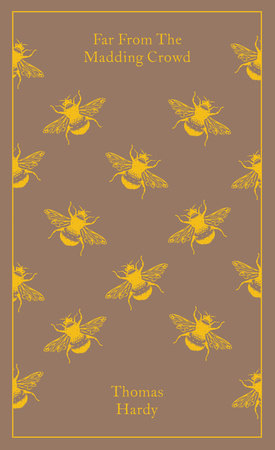Review by The Quidnunc
I first read a Thomas Hardy novel when I was 9 years old... From that moment on I fell in love with English literature. For most girls it has always been Jane Austin and the Bronte Sisters... For me it has always been and always be only Hardy. Even cinematicaly we have always understood each other very well. From the early adaptation of Tess of the D'Urbervilles to the latest Far From the Madding Crowd it has been a journey of love and re-play.
Today I am going to review the book, but be sure that the 2015 film will no disappoint you either. Far From the Madding Crowd is the quintessential ‘rural read’. IT tells the story of Bathsheba, a young woman who inherits her uncle’s farm
and decides to run it herself. While running the farm, Bathsheba
becomes the target of three potential suitors: the wholesome Shepherd
Gabriel Oak, the lonely and wealthy Mr Boldwood and the handsome but
dastardly cad Sergeant Troy. It is this narrative that drives the story,
which is filled out with events on the farm. I love Bathsheba for she is is a marvellous free spirit embodied with verve and passion and steely courage. She races her horse across the moors of Wessex — Hardy’s
fictionalization of the rural English county of Dorset — riding
astraddle in a most unladylike yet most practical manner. She wears a
cool leather jacket and “intend[s] to astonish” the workers at her
uncle’s farming estate, which she has just inherited and will run as if
she were a man, even though it is the female-unfriendly Victorian 1870s.
That girl is what I would call a Victorian Hurricane.
 Every few years I re-read it and the answer is always the same Far From the Madding Crowd is a wonderfully written story that simply pushed all my buttons. It is the novel which established
Every few years I re-read it and the answer is always the same Far From the Madding Crowd is a wonderfully written story that simply pushed all my buttons. It is the novel which established
Thomas Hardy as a writer and opened
the door which would allow him to make a living out of writing, rather
than being a carpenter. Even though other novels, such as Tess of the
D’Urbervilles or Jude the Obscure are probably better known to the
wide public, Far from the Madding Crowd is special in many ways. Furthermore, Bathsheba defines Hardy as a sympathetic feminist. It is not my
intention to bore you with literary criticism matters, but, for the
Hardy fan, it is common knowledge that he rather sides with his feminine
characters than with the masculine ones. Bathsheba is one of the first
characters which allows Hardy to fully do this. She determines one man
(Boldwood) to commit murder and then suicide, she faces Sergeant Troy
when he unmasks himself for who he really was and finally accepts
Gabriel next to her, not as a sign of surrendering to male power, but as
a sign of wit and virtue.
The novel abounds in symbols and each character is more than a
typology. Sergeant Troy, for instance is often viewed by critics as a
figure of the devil. However, let’s not forget that the READER is the
most important critic, so if you want to give meaning to the other
characters yourself, this novel is a must-read.
Another reason why Far from the Madding Crowd is bound to become one of your favourites is that it will surely change the meaning of ”Valentine’s day” for you, forever after.


No comments:
Post a Comment